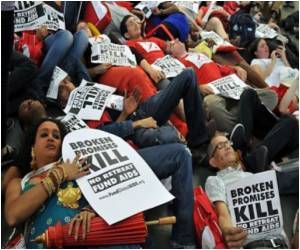
And he joined with the Microsoft tycoon in calling for smarter, cheaper ways to treat and prevent HIV in an era of belt-tightening.
"I completely understand why the advocates for greater AIDS funding have loudly protested. But I do not think it is either fair or accurate to say the president has gone back on his promises as if this was a callous walking away," Clinton said in a keynote speech.
New figures point to an ever-widening gap between resources and needs for helping the 33.4 million people with AIDS or the human immunodeficiency virus (HIV).
The worrying shortfall is being blamed on donors' cutbacks after the 2008 economic crisis -- but also from the spiralling cost of putting more and more poor people on lifesaving, but also lifelong, drugs to repress HIV.
UN Secretary General Ban Ki-moon warned in a conference-opening message on Sunday that hard-won progress could be reversed by a retreat on funding.
Advertisement
Obama's 2011 fiscal year spending plan of 5.7 billion dollars is just 236 million dollars more than 2009, the Bush administration's last fiscal year, according to the US anti-AIDS organisation amfAR.
Advertisement
AIDS campaigners were best advised to show governments -- and thus taxpayers -- that their own house was in order, said Clinton.
"If we are going to make this case, they are going to have to believe that we are doing our job faster, better and cheaper, and then we have the moral standing to go ask people for more money."
Clinton's appeal for cost and efficiency gains was echoed by Gates, who with his wife Melinda is the world's biggest single private donor on AIDS, contributing 2.2 billion dollars since 1999.
"Right now there simply isn't enough money to treat our way out of this epidemic," Gates warned.
"If we keep spending our resources in exactly the same way that we do today, we'll fall even further behind in our ability to treat everyone."
The philanthropist called for further efforts to ratchet down drug prices, a shift to lower medical costs by transferring some tasks from doctors to nurses and promoting male circumcision as a proven method of shielding men from HIV.
"If we could limit the delivery in administrative costs to no more than twice the cost of the drugs themselves, then the total cost of treatment could get down to 300 dollars per patient per year," said Gates.
"If we achieve that for the amount of money we spend today on treatment, we could treat twice as many people."
From 2002 to 2008 donations from rich economies for poor countries surged from 1.2 billion to 7.7 billion dollars, but fell back last year to 7.6 billion, according to an analysis by the Kaiser Family Foundation and UNAIDS.
That left a funding shortfall last year from all sources of more than seven billion dollars.
The widening gap threatens the goal of providing universal access to AIDS drugs and may even disrupt supplies to those already on the lifeline therapy, say some experts.
A total of 5.2 million people had access to the drugs at the end of 2009, a rise of 1.2 million in a single year, the World Health Organisation (WHO) said on Monday.
Experts said that this amounted to roughly half of the badly-infected people who need the treatment -- and to just a third, if the WHO's brand-new recommendations for earlier treatment were considered.
Source-AFP









